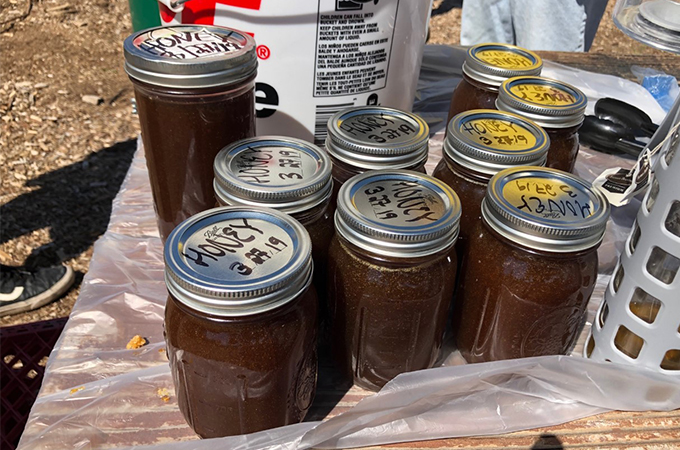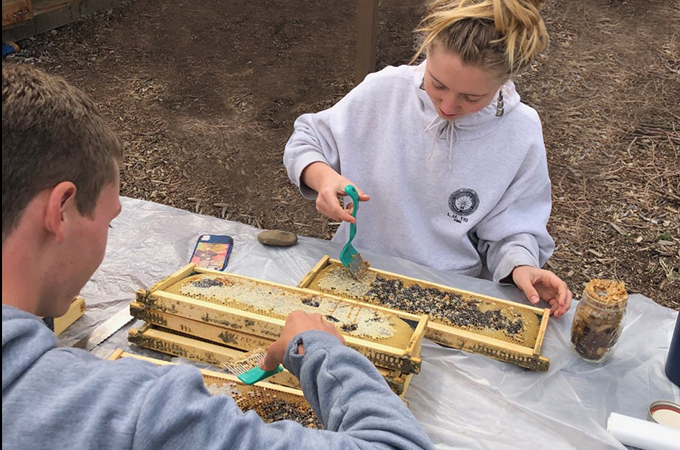Why are bees important for the environment? Are bees dangerous? Students, faculty, and staff at the Sustainable University of Redlands Farm (SURF) are trying to raise awareness about these important creatures and recently hosted an inaugural honey harvest to aid in the effort.
SURF is a natural farm on the University of Redlands main campus that works to uphold sustainable agricultural practices. Students who maintain the farm utilize methods such as crop rotation, composting, and planting “green manures” (crops that are left to become fertilizer) in certain areas. The farm is also occasionally used as an outdoor classroom for May Term courses in sustainable gardening.
For Ellie Obrochta ’19, the farm presented an opportunity to work outside and have a hand in growing vegetables. Working on the farm since she was a first-year student, Obrochta became one of the farm’s student directors and came up with the idea to start a beekeeping program.
“After finding out what’s happening to the bees, I wanted to try to get two hives for the farm,” she says. “I’ve learned a lot about pollination and supporting the local bee community [at the University of Redlands], and maintaining a hive and having a honey harvest is a great way to do that.”

On March 29, a number of students, along with Outreach and Sustainability Coordinator Eric Tengler and School of Education Professor Brian Charest, gathered for a full day of honey harvesting. Charest, who previously developed a beekeeping hobby, worked with Tengler and the students to acquire funding for the program from the School of Education and the Johnston Center for Integrative Studies.
After losing a large portion of the bees due to winter weather, the group saw an opportunity to harvest the honey. The first step in the process includes uncapping the honey from the honeycomb using a knife or pick. Once the honey is uncapped, the honeycomb is placed into an extractor, which is a large, metal barrel with a crank mechanism on the side. Using centripetal force, the extractor pushes the honey out of the comb and out of the barrel. The honey is then filtered to remove any excess wax or particles and packaged in jars.
Throughout the harvest, the group paired the honey with different foods such as orange slices and coffee. In the end, the harvest resulted in about 10 large jars of honey. “The best part of this whole process was seeing the collective effort,” says Theo Whitcomb ’19, another student director on the farm. “The reason we got the bees was to educate people and allow SURF to be a place where people are engaged and learning about how things are grown and cared for.”
Obrochta, Charest, and Whitcomb note that many misconceptions about bees prevent people from learning about and engaging with them. Some people think that bees are dangerous or that they’ll automatically be stung if they get too close to the hive. But protective gear is only worn if beekeepers are opening bee boxes and disturbing the hive. There were no live bees present during the honey harvest.

Bees are also important for the environment as local pollinators. Unlike honeybees, local bees know how to pollinate plants native to the region. Without them, native plants and crops can’t grow. “When people find out there are bees on the farm, they are full of questions,” says Charest. “People want to learn more about bees and how they can get involved in the program. It’s really great to see that excitement.”
In the future, the group hopes to continue educating the community about bees by hosting regular honey harvests. “We’re getting a new queen this spring,” says Obrochta. “There are plenty of people looking forward to keeping this going.”
Learn more about Community Service Learning and sustainability at the University of Redlands.






